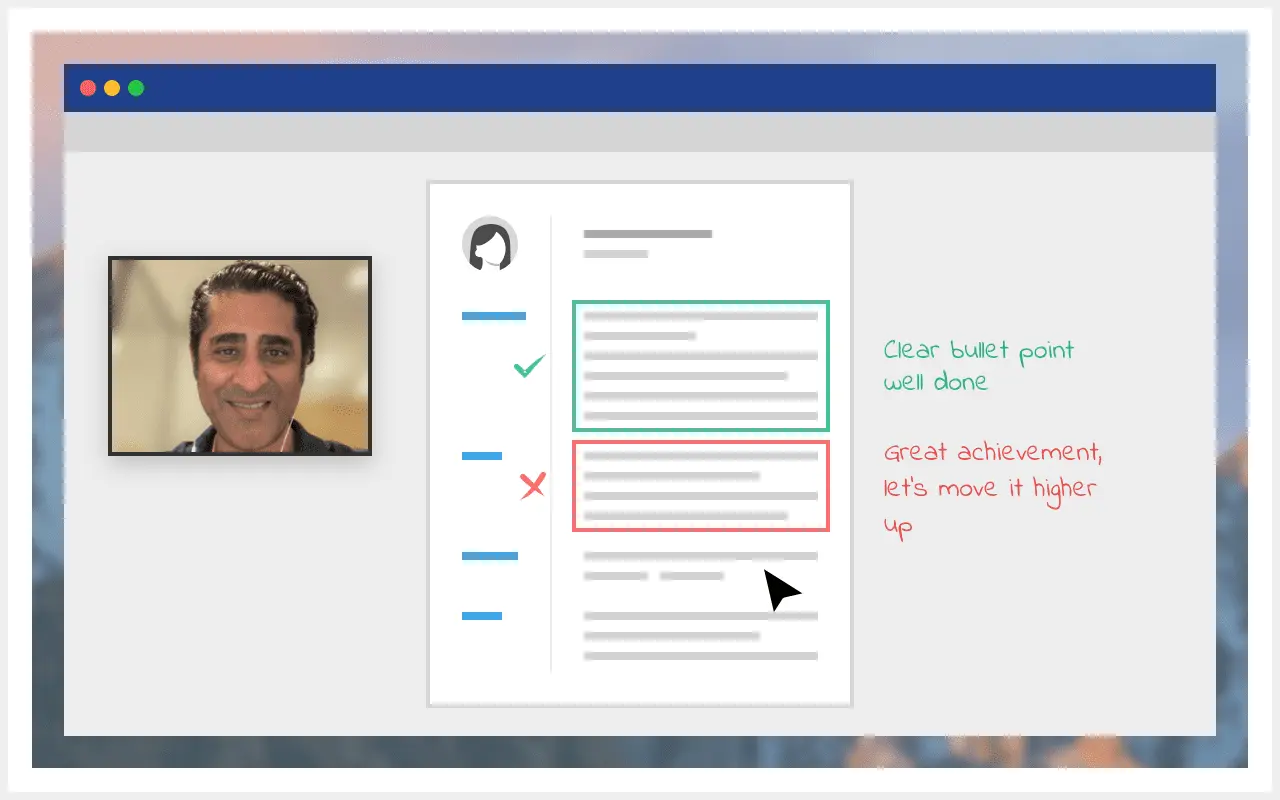Every year, ~200,000 candidates apply to McKinsey, but only ~2,000 of them end up getting an offer. That's a 1% success rate. Candidates usually don't know this, but the most competitive step in the recruiting process is the cover letter and resume screening. That's where more than 60% of candidates get eliminated.
So how do you craft a management consultant resume that gets you interviews at McKinsey, BCG, and Bain?
Because here’s the thing: consultant resumes are actually VERY different from CVs for other professions.
So, let's step through the consulting resume basics and writing tips you should be aware of. Plus, we’ll review 5 REAL CV examples that landed candidates interviews and jobs with McKinsey, BCG, Bain and other top firms.
- What do top management consulting firms look for?
- 5 consulting resume examples (from REAL candidates)
- Consulting resume template
- Consulting resume tips
- How to write a great consulting resume (step-by-step)
- Consulting resume checklist
Let’s get into it.
Click here for a resume review with an ex-MBB consultant
1. What do top management consulting firms look for?↑
Before crafting a consulting resume that will get you multiple interviews, you first need to understand what top consulting firms actually look for in a candidate.
There are two versions of the truth when it comes to this topic: the official version on every firm's website, and the unofficial one that they are less willing to talk about.
1.1 Official version
As we have already mentioned in our case interview guide, all top consulting firms broadly look for the same skills. This is particularly apparent when comparing the skills McKinsey, BCG, and Bain list in their job description requirements.
Top consulting firms tend to all be interested in candidates who exhibit the following:
- Problem-solving. This means you need to have shown strong intellectual abilities to solve problems at university and during your work experiences. You also need to demonstrate strong quantitative and analytical skills to stand out.
- Personal impact. This means you've shown a dedication to achieving great things in most projects you undertook in the past. Your resume needs to showcase instances that demonstrate your strong personal initiative and resilience in the quest for success.
- Entrepreneurial drive. This means you should have a track record of launching new initiatives. You are not satisfied with doing things the traditional way. You like innovating, even if that means having to manage ambiguous situations.
- Teamwork and leadership. This means you've shown you can lead groups of people in the past either in a professional context, at university, or in any extracurricular activities. This also includes your effective communication skills and ability to collaborate with and manage different stakeholder relationships.
The first objective of your resume should be to highlight relevant parts of your experience that demonstrate these skills. Each bullet point in your resume should specifically target one. And overall, your bullet points should be balanced across these four categories.
For instance, let's assume that there are 20 bullet points in your resume. Broadly speaking, 5 of your bullet points should show your strength in problem-solving and 5 should show that you deliver impact when you are part of teams. Another 5 should show that you are used to taking initiative. And yet another 5 should show that you can lead teams.
Doing this will take you a long way in crafting a successful application. Trust us, it works both for entry-level and experienced hire resumes. But unfortunately, there are also untold truths about consulting CVs that you need to be aware of.
1.2 Unofficial version
If you meet the above qualifications, then great! But it would also be helpful if you keep in mind the following ‘unofficial’ preferences that top consulting firms rarely put in their job requirements. They’re as follows:
- Big brand names
First, your resume screener will be looking for big brand names when going through your CV. If you went to a target school (e.g. Harvard, Stanford, Oxford, Cambridge, etc.), that will definitely help.
If you did not attend a target school then your best chance of getting noticed is to have worked for companies that are big and well-known.
You might be wondering why consulting firms value big-brand universities and employers so much. To be frank, top consulting firms are snobs when it comes to academic and professional pedigree. This is obviously slightly unfair, but there are a couple of reasons things work that way.
First, it's easier to sell Junior consultants to clients if they have an impressive background. When a client asks "Who will be on the team?" Partners like to be able to answer "Melissa just joined us with a bachelor's from Oxford and an MBA from Harvard" or "Bukayo joins us after 3 years leading a team at Google." That makes it easier to justify the high salaries consulting staff get paid.
Second, consulting firms receive a LOT of applications every year. McKinsey, for instance, received about ~200,000 resumes each year. They can't interview everyone and need a pretty efficient way to get to a manageable number of candidates they can interview. Big brand names are a shortcut. They want to hire high-achievers and assume that if you went to a top school or worked for a top employer, you are a high achiever.
This can feel very frustrating and unfair if you don't have big brand names on your resume. In these situations, it does not mean you won't be able to make it into consulting. It just means that unfortunately, it will likely be more work for you than for other people. You will have to network more, consider working/doing an internship at big brand names first, and maybe apply to consulting firms multiple times. But you can still do it.
- GPA/Grades cut-off
One of the questions we often get about consulting resumes is: "I have a 3.X GPA from University Y. Will I make the cut-off?" To be clear, there's no official GPA cut-off in the US, or grades cut-off in other countries.
Your resume will usually be reviewed by a recent graduate from your university who works at the firm. They will score your resume on a number of dimensions, one of which will be your grades.
If your grades are on the lower end (GPA < 3.5 in the US, 2:1 or less in the UK), you will obviously get fewer points than if they were higher. As a consequence, you will need to compensate for this with very strong achievements in other areas of your resume. This could be an extracurricular activity where you showed strong leadership and entrepreneurship skills.
- Languages
Finally, one important aspect of consulting resumes that's not discussed often is languages. Only a few job posts (mostly openings for positions in regions where English isn’t the primary language) explicitly require proficiency in languages other than English.
But even if you’re applying to an English-speaking firm, speaking multiple languages fluently will boost your chances of getting an interview.
Indeed, most consulting firms operate a global staffing model. If you are based in the London office but speak French and Spanish, that means your firm will be able to send you on projects in the UK, France, and Spain, but also North and South America and many countries in Africa. Your value to the firm will therefore be much higher than if you only spoke English.
Do you want expert advice on how to get into consulting?
Our management consultant coaches can help you build an actionable plan to get into consulting and boost your chances of landing a job at MBB or any top consulting firms. Click here to book a 1-to-1 consulting career coaching session.
2. 5 Real consulting resume examples↑
Before we start on how to write your consulting resume, let's take a look at samples of what you should be aiming for.
Unlike in other articles on this topic, these are all real resumes that got real candidates job offers at top global consulting companies. Note that we’ve anonymised most of the resumes to protect the resume owners’ privacy.
2.1 McKinsey resume examples
Jacob’s McKinsey resume
This resume got the candidate an interview (and later an offer) at McKinsey, which is where he's now working. (Please note that we've changed the names of the companies to protect the candidate's privacy).


This is a seriously high-quality resume. Here's what Jacob does particularly well:
- Quantifying achievements: Jacob uses numbers to make his achievements shine. Notice how his work achievements are full of specific sums of money or percentages. This ensures that we can clearly understand the impact he has had.
- Action verbs: Jacob starts his bullet points with verbs describing key actions for a consultant: "Developed investment case", "Solved client's concern", "Identified commercial risk".
- Skills & Interests: You can bet that Jacob had even more great work achievements that he had to leave out to fit in a strong Skills and Interests section. But it's definitely worth it - in four lines he's able to make himself stand out from the crowd with some very specific and interesting passions.
- Font trick! You almost certainly didn't notice, but the penultimate line of Jacob's resume is in font 10, rather than 10.5. This helped him squeeze it all onto one page.
Henry’s McKinsey resume
This is the resume that got “Henry” (not his real name) a consultant role at McKinsey.

Here’s what we think makes this resume stand out:
- Highly targeted: Apart from his professional consultant experience, notice that two of Henry’s internship experiences are not directly related to management consulting. But they earn their spots in his resume because he’s able to highlight the aspects of these experiences that are relevant to consulting, i.e. client relationship management, project management methodologies and tools, and collaboration. They also show that he’s suitable for a range of different industries such as manufacturing, insurance, and finance.
- Action verbs: Henry starts his bullet points with verbs describing key actions for a consultant: “Formulated a strategy”, “Performed competitive benchmarking”, “Advised on R&D roadmap”, “Mentored 4 interns” etc.
2.2 BCG resume examples
David's BCG resume
The below resume belongs to David, a consulting interview coach on our platform (currently a hiring manager at Revolut for the Global Strategy Team). It's the resume that got him into BCG in 2020.


Here's what we found interesting about David's resume:
- Clarity: David is extremely concise. He sticks to one page and leaves plenty of white space, making it extremely easy for a recruiter to read quickly.
- Project-based approach: David has worked on a lot of different projects in a short space of time. By listing many of these projects, he demonstrates experience across different consultant skillsets.
Theo’s BCG resume
This is the resume that got “Theo” an associate role at BCG. BCG recruiters have used this particular resume in university workshops as an example of what to aim for so it’s an excellent model to study.


Here are the highlights that we think make Theo’s resume attractive to recruiters:
- Achievement-oriented: Theo’s resume is a great example of how a candidate with limited work experience can leverage their educational and extracurricular achievements. He lists down his grades and awards and has bullet points demonstrating specific skills such as problem-solving, innovating, teamwork, and leadership.
- Quantified success: In his two professional/internship experiences, Theo quantifies his achievements (“success rate of more than 90%”, “10% salary increase in the first year”).
2.3 Bain resume examples
Suresh’s Bain resume
This resume earned the candidate, let's call him “Suresh”, a role at Bain.


Here's our feedback on this resume:
- Quantified impact: Suresh does a great job of quantifying the impact of his achievements, giving specific numbers when possible.
- Additional information: Suresh uses the last section well to demonstrate an interesting depth of personality and other skills such as writing and languages.
- Layout: Extremely simple layout is clean and very easy to digest.
3. Consulting resume template↑
Now that you’ve seen a few stellar examples of consulting resumes that work, let’s take a look at this consulting resume template. Use it as a basis or reference point for writing your consulting resume.
A word of advice: a lot of people use this template so be careful about how you use it. Take inspiration, but be sure to write every sentence from scratch.
Just a few notes about the template:
- It’s based on a consulting resume of a candidate who got interviews at McKinsey, BCG and Bain. You can trust this template works.
- This resume might look impressive. It's one of the best ones we have seen. Even if you have not achieved as much as this person, you can still get an interview.

Click here to download the resume template as a Google doc.
Click here to download the resume template as a PDF.
4. Consulting resume tips
Before we take you through the step-by-step process of writing your consulting resume, here are the 9 things we’ve learned after having reviewed hundreds of CVs over the past few years. Our expert coaches, Cody (top tech recruiter, ex-Google now at LinkedIn) and Candace (career and resume expert) also weigh in with their insights.
4.1 Keep it to one page
Consulting recruiters have to review tons of resumes daily. Keeping your resume to one page is one way to make the job easy for them. But we know condensing your entire lifetime's achievements in ~500 words is difficult.
The key is to select the right achievements and to describe them in a way that makes it clear you would make a great consultant. It takes time and a few iterations to get it right, so start earlier rather than later.
4.2 Organize your resume into 5 sections
The best consulting resumes have 5 sections: Personal information, Education, Work experience, Extracurricular achievements, and Additional skills.
One of the most common mistakes we see in CVs is to not have an "Extracurricular achievements" section. This is a BIG mistake as this is a section you can use to showcase some of the skills that consulting firms look for such as leadership and entrepreneurial drive.
4.3 Avoid fancy designs
"Design features like pictures, columns, photos, etc. can prevent ATS systems from correctly scanning your resume," says Candace.
Using a special format with a slightly funky font is tempting. You might think it could help you stand out. But it won’t. Most, if not all, companies now use Applicant Tracking Systems or ATS to pre-scan resumes. So your fancy resume might not even make the ATS cut.
Let’s say your funky resume somehow managed to pass through the ATS. You still won't get extra points for it. At best, your CV screener will think: "Okay, I've never seen this format, but why not?" At worst, they will think: "Who is this person? They don't get it!"
The content of your resume should stand out, not its format.
You should also avoid including your photo in your resume unless it’s specifically required. This goes against employment and discrimination laws in most countries, and is another potential problem for ATS systems.
4.4 Use action verbs
"Us recruiters are lazy. Don't make us dig around for the key info, we want to see if you meet the job requirements in the first 10 seconds!" says Cody.
A good way to make a good first impression in 10 seconds is by using keywords in the form of action verbs that resume screeners are either consciously or subconsciously looking for. ALL your sentences should start with an action verb that highlights one of the soft skills the firms are looking for.
For instance, you should have bullet points on leadership that start with: "Led a team of 10 people..." And bullet points on problem-solving which start with: "Solved one of the toughest engineering problems..."
These action verbs are important because they are at the beginning of sentences. If you use the right ones, your resume screener will immediately think: "Okay, this person has the right skills. Let me look at their CV in more detail."
4.5 Quantify your achievements
“This advice is for many careers spanning many industries, we have to tell our story through data and numbers. Words can tell a story but numbers tell it way better," says Cody.
Consultants are obsessed with quantifying things. When you become a consultant, a big part of your job is to crunch numbers to back up ideas you present to clients. If your idea is not backed up by numbers, it's just a point of view. If it is backed up by numbers, it becomes an argument and has more gravitas.
For instance, if you were awarded a scholarship to study abroad you should write something like: "Awarded Entente Cordiale Scholarship to study in the UK (2 scholarships for 1,000+ applicants)" This will make you stand out much more than if you had just written: "Awarded a competitive scholarship to study in the UK."
4.6 Dumb things down
This is particularly important if you have written a Ph.D. or Master's thesis. Your resume screener won't be familiar with your field. And they won't take the time to Google anything they don't understand. It is your responsibility to dumb things down sufficiently for them to be understandable.
A good test for this is to ask a friend or sibling to highlight anything that they don't easily understand in your resume. If you find them scratching their head to make sense of a sentence, it is too complicated. Simplifying things is hard work, so you should start this process early.
4.7 Highlight your soft skills
As mentioned in the first section of this guide, McKinsey, BCG, Bain and other top firms are looking for skills that are very specific to consulting. A lot of those skills are actually SOFT skills such as leadership, personal impact, entrepreneurial drive, etc.
If you have a standard resume that you use for other jobs, you will most likely have to adapt it to showcase the specific soft skills consulting firms look for. If you don't do this, you run the risk of your CV being overlooked as it's not tailored enough to consulting.
4.8 Be unique
Your resume screener will literally have looked at hundreds of CVs before they look at yours. The reality is a lot of these resumes are quite similar. So, if there's something a little bit unique that you have done, you should not hesitate to say so.
For instance, you might have worked for 6 months in a surf shop in Australia, or you might have done a 6-month unpaid internship for charity. Everything that differentiates you in a positive way should be clearly mentioned on your resume.
4.9 Don't get AI to write it for you!
With the boom in AI technology and the likes of ChatGPT increasingly used by students and applicants, it's tempting to think you could get a bot to write your resume. And if you're finding it hard to get started, AI can be quite helpful in giving you examples of the sorts of phrases you should be writing.
However, rely too much on AI and you run the risk of your CV looking exactly like everyone else's and not truly representing who you are: a unique individual and (hopefully) a great consultant in the making!
5. How to write a consulting resume↑
Now that you’ve seen examples of what you should be aiming for, as well as some key tips, let’s go through the resume-building process.
5.1 Study your target company and job description
Before you start writing or editing your resume, our tip is that you do some research.
Find the job specification, read it thoroughly, and use it to shape your resume.
- Figure out if you’re applying for a general consultant role or an industry consultant role. Some job posts will have a general ‘consultant’ opening. This means you don’t have to start with a specific expertise and are expected to develop one on the job. Others are highly targeted and will have a specific industry that they’re building teams for, such as finance, healthcare, tech, and others.
- Prepare to adapt your resume accordingly. Look into the keywords of the job description and use them as much as possible where they’re applicable. Suppose your previous jobs or internships are not directly related to consulting. In that case, you can phrase your descriptions to highlight specific consulting skills such as leadership, project management, problem-solving, etc. Same goes for your extracurriculars.
- Zoom in on a few of the responsibilities in the job description that you think are most important. Search for specific examples from your past that demonstrate experience in doing the same thing or very similar. Find the numbers to back it up where possible, so you’re ready to include this information in the work experience section later on.
- Take note of the language used in the job description so you can, where appropriate, match specific verbs and phrases.
- Research the company. If you have a particular interest or expertise, you’ll want to get into the firm that matches it. If you know anyone who works in your target company, you might want to ask them for advice or information about what their company is specifically looking for.
Now you’re probably wondering: do you have to write a different targeted consulting resume for every company you’re applying to?
The answer is: ideally, yes. But as we’ve covered in the section at the beginning, these top companies are typically looking for more or less the same qualifications.
We looked at some of the latest job postings on McKinsey, BCG, and Bain and aggregated the data to find the most common consulting job requirements for top companies in 2024. And here’s what we found:
Typical consultant job requirements
Minimum Qualifications
- Bachelor’s degree, with a strong academic record
- Robust analytical and problem-solving skills
- Above-average communication and presentation skills
- Relevant experience (in consulting or specific industry indicated)
Preferred Qualifications
- Advanced degree (MBA, PhD, or additional qualifications or certifications)
- Specific industry expertise (financial services, healthcare, technology, etc.)
- Prior consulting experience (familiarity with consulting methodologies and client engagement)
- Language skills (for positions in non-English-speaking regions, proficiency in local languages is often preferred)
Common Responsibilities
- Engaging with clients to understand their needs, present findings, and provide recommendations; building and maintaining strong client relationships
- Leading and managing consulting projects, including overseeing project deliverables, coordinating team efforts, and ensuring timely completion
- Performing in-depth analysis to identify issues, evaluate data, and develop actionable insights, using analytical tools and methodologies
- Collaborating with team members and sometimes mentoring junior staff
- Assisting clients with the implementation of recommendations or strategies to ensure successful execution
If you don't want to have to tweak your resume for each specific company you're applying to, aim to base your resume around this list of requirements.
Once you’re done with your research, let’s get into writing your consulting resume!
5.2 Organize your resume by sections
As you’ve seen in the example resumes and the resume template, every consulting CV should be split into 5 sections:
- Personal information
- Education
- Work experience
- Extracurricular achievements
- Additional skills
Below are a few best practices for coming up with a layout for your resume:
- Choose a professional-looking font: Size 10-12, black and white. Arial, Calibri, and other plain sans serif or serif fonts are fine.
- Use bullet points.
- Make sure the formatting is 100% neat and consistent.
- Include enough white space so that it doesn’t look overcrowded.
- Save it as a PDF so it looks uniform on any device.
Now, let’s get into each section.
5.2.1 Personal information

In this section, you should include all the basic personal details the consulting firm you are applying for is requesting. Here are a few things to keep in mind as you put this section together:
- Use a larger font for your name than for the rest of the section to make it stand out.
- Don't insert your headshot, date of birth, or gender unless specifically requested by the firm.
- Use a neutral/professional email address. Keep your hilarious email address for friends and family.
- Double-check all your details including your email address and phone number before sending your resume.
- No need to include your street address–this may cause issues with data privacy laws; just your general region will do.
- No need to label each item, e.g “email:”, “tel:”, etc. It’s obvious what they are, so save the space.
5.2.2 Education

This section should summarise the different degrees you graduated with. It should NOT include your high school experience. If you have recently graduated and only have internship experience, this section should follow the Personal information section.
But if you have already had a first job for 1+ years, you could consider swapping this section with the Work Experience section.
Here are a few tips on how to write this section:
- If you have multiple degrees (e.g.: a BA and an MBA), you should write a subsection like the one above for each degree, starting with your highest level of education first (e.g.: your MBA).
- For each degree, include the name of the degree, university, and dates in the headline. You should also describe relevant course content briefly (no more than one line).
- List your grades (e.g.: GPA) as well as results on other standardised tests you have taken (e.g.: SAT, GMAT, etc.)
- Detail all the awards and scholarships you have received, and most importantly how competitive they were (e.g.: 2 awards for 1,000 students).
- If you have written a thesis/dissertation, you should also summarise the topic in a way that's very easy to understand. Note if it is being published in academic journals.
5.2.3 Work experience

The work experience section should include the previous work positions you have held as well as your main achievements in these roles. Here are some more important points to help you put this section together:
- Use reverse chronological order, putting most recent employment at the top
- Include the name of the position you held and the employer as well as the location and dates in the headline. The first line of the section should then describe your employer/department in one sentence. Notice that this mirrors the structure used for the Education section.
- Start each bullet point with an action verb that matches one of the skills consulting firms look for (Leadership, Entrepreneurial drive, Personal impact, Problem-solving, etc.). "Led", "Analysed" or "Presented" are good examples of such verbs.
- Use present tense verbs (e.g "Lead, Develop, Execute") in your current position (except for completed achievements), and past tense verbs for past position (e.g "Led, Developed, Executed")
- Balance the skills you demonstrate as much as possible. For instance, notice how some of the bullet points above are about leadership while others are about problem-solving.
- Focus on the results of what you did and quantify them as much as possible to highlight the tangible contributions you have made. Ex-Google SVP Lazlo Bock talks about a common method for doing this that you might find helpful, called the “X, Y, Z” formula: “Accomplished [X] as measured by [Y] by doing [Z]”.
5.2.4 Extracurricular achievements

One of the most common mistakes we come across in resumes we receive from candidates is the absence of an extracurricular achievements section.
This section is particularly important if you have limited work experience as it's a great way to show leadership, entrepreneurial drive and personal impact. It's also a great way to compensate for average university grades or a non-target school.
The way you write about your extracurricular experiences should follow the same format and tips as for the Work experience section. Here are different types of activities you could write about (not exhaustive):
- University clubs: if you have held a position in a university club (e.g. Consulting club, Finance club, Theatre club, etc.) you should definitely mention it. The "higher" the position the better, as it could highlight your ability to lead and manage others.
- Sports team: if you were part of a university sports team, you should definitely highlight that along with the achievements of the team. This will highlight your ability to work with others.
- Side businesses: if you have set up a side business with friends at university, you should mention it along with the number of customers/revenue you have managed to achieve. This will show your entrepreneurial drive.
- Writing/arts: if you enjoy writing or any other art form and have published your work or have online followers, you should also not hesitate to mention it. This will help showcase your creativity.
5.2.5 Additional skills

Finally, you should focus the last section of your resume on any additional skills you have.
Our recommendation here is to keep things simple and to list any foreign languages, programming languages, software experience, or project management tools that you know.
For each language, you should specify your level of proficiency. For the technical skills, you can also specify your level (experienced or expert).
5.3 Ask for feedback
Now that you have put together the first version of your resume, your next step is to ask for feedback to improve it. If you know any consultants or former consultants, don’t hesitate to reach out to them to get their thoughts.
But failing that, asking for feedback from peers is also helpful. They'll be able to cast a fresh eye on your resume and flag typos, inconsistencies, or sentences that they find difficult to understand.
5.4 Proofread - multiple times!
This is the last step of crafting your CV and it is crucial. You should never skip this part.
When you become a consultant, one of your deliverables will be PowerPoint decks and Word documents. You’ll be expected to proofread these multiple times before handing them over to clients. So even as an applicant, you’ll be expected to do the same with your resume.
In particular, make sure to triple-check your contact details. You don’t want to miss out on an interview because of a typo in your email address.
6. Your consulting resume checklist↑
Almost ready to send your resume? Use this checklist to make sure you’re following the best practices we’ve recommended above.
You should be answering “Yes” to every question.
Overall
- Have you demonstrated the 4 key consultant traits? (problem-solving, personal impact, entrepreneurial drive, teamwork and leadership)
Layout
- Is it just one page?
- Is the formatting 100% consistent and neat?
- Is there enough white space to breathe?
Personal Information
- Have you triple-checked to make sure your contact details are correct?
Work Experience
- Have you talked about your ACTIONS rather than your responsibilities?
- Have you QUANTIFIED the impact of your actions?
- Have you got the tenses correct?
Extracurricular achievements
- If you graduated >5 years ago, are your examples post-university?
- Do your extracurricular activities make you stand out in some way?
Additional skills
- Have you listed any languages you speak and your level of proficiency?
- Have you added any additional skills or competencies that could add value?
Proofreading and feedback
- Have you proofread it since you last edited it?
- Have you gotten any feedback on your resume and updated it?
- Have you saved it as a PDF to make sure it displays correctly on all devices?
Did you say “Yes” to every question in the checklist? Well done! If you’ve used all the tips in this article, then your resume should be in good condition and will give you a fighting chance of getting that interview.
7. Is your consulting resume truly outstanding?↑
The guide above as well as our consulting cover letter guide should go a long way in helping you craft documents that will get you interviews.
But to get your consulting resume from "fine" to "outstanding" usually requires feedback from someone who really knows their stuff - as in an ex-recruiter or manager at one of the MBB firms.
By signing up to our resume service, you can choose from our team of management consultant coaches like David, Htoo, Tiago, Shankar, and recruiting experts like Candace and Cody. They will spend an hour going over your CV with you and give you feedback on how to immediately improve your resume, including what experience to focus on, how to optimize your phrasing, formatting, etc.
Check it out and increase your chances of getting an interview at a top firm!











